We’ve said it before that we’re big fans of outdoor cat enclosures, and two weeks ago we finally installed our own custom catio (photo below) and our cats are loving it!
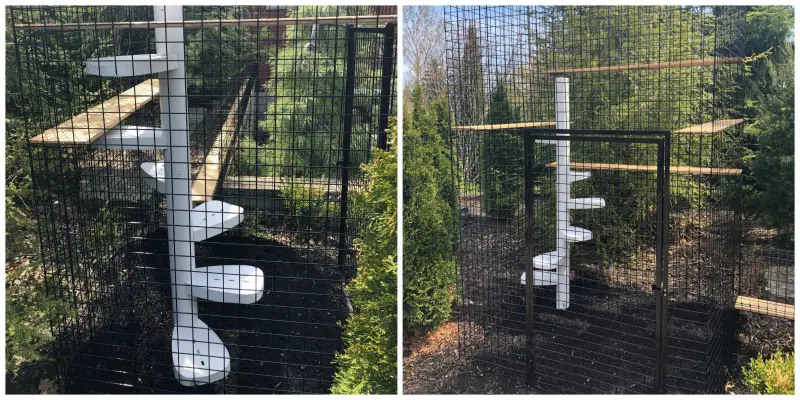
[Credits – this luxurious Catio was designed by Kris Kischer (owner of Habitat Haven) and the white scalable cat ladder is from James & Jennie who own @monkeetreenz ]
In 2017 we did a post called 5 Reasons Why So Many Cat Owners Are Investing in Catios. The response to this article was overwhelming in terms of support for catios as a means to offer our cats the outdoor enrichment they crave in a safe and comfortable environment.
In 2018 we spoke with catio evangelist Alan Breslauer who offered us his unique perspective in a guest post aptly titled ‘The Moral Case for Catios‘.
We thought it a great idea to repost that article … here’s Alan had to say…
“The greatness of a nation and its moral progress can be judged by the way its animals are treated.” ― Mahatma Gandhi
If you believe Gandhi, the United States is a significantly greater country today than it was even a decade ago. Just seven years ago we recognized the cruelty of confining killer whales to tiny saltwater tanks to perform tricks for our amusement. Protests and a drop in marine park attendance forced Sea World to announce the eventual end of orca exploitation.
Similarly, Ringling Bros. and Barnum & Bailey Circus no longer prod elephants for human entertainment, having retired the performing pachyderms to a 200 acre Florida sanctuary in 2016. More than 20 zoos have also refused to house elephants, which have complex needs, because they lack sufficient grounds.
Strides have also been made closer to home as evidenced by the booming $69 billion pet industry. According to one poll, 76% of owners classify their pets as “beloved members of the family.” Dogs have especially seen an uptick in their treatment with both dog walking services and doggie daycare businesses thriving.
Cats are likely to be the next beneficiaries of human moral progress. There is a movement sweeping the country to educate cat owners about the perils of allowing our feline friends to roam freely outdoors. As celebrity cat expert, Jackson Galaxy, plainly states, “I want cats to be indoors because I want them to live.”
Best selling cat author Pam Johnson-Bennett agrees, “My opinion is cats are safe indoors… Letting your cat outdoors to roam the neighborhood puts her at risk for disease, injury, fighting, poisoning, abuse, parasites, and getting lost, stolen, or hit by a car.”
They have a point. The average lifespan of a domestic indoor cat is about 17 years while the dangerous outdoors conspire to knock more than a decade off a roaming cats life. With this knowledge, fewer owners are willing to send their beloved family members off to an early death.
Environmentalists, including Pete Marra, the director of the Smithsonian Migratory Bird Center, also advocate for keeping cats, one of the 100 worst invasive species on the planet, indoors. According to Marra, cats “are the number one killer of birds in the United States at over two billion birds per year.”
However, relegating cats to the indoors poses it’s own problems. Johnson-Bennett warns that under-stimulated house cats can lead to “boredom-related or stress-relieving behaviors, such as overgrooming, chewing inappropriate items, picking on companion pets, retreating into isolation, overeating, self-mutilation, compulsive behavior, and loss of appetite.”
The American Association of Feline Practitioners (AAFP) echoed those concerns in a recent position statement, concluding that “The innate needs of the cat are difficult or impossible to replicate in the indoor environment.” Unfortunately, “an increased incidence of behavior problems” in indoor cats has led to “an increase in relinquishment or euthanasia.”
The AAFP emphasizes that, “indoor/outdoor living for cats in an environment that is safe is the best option for pet cats. Safe outdoor living keeps the cat away from most dangers and yet provides a more stimulating environment with potential for more normal feline behavior.” The takeaway from the organization that sets the standards for feline care is, “Whenever possible, an outdoor enclosure is preferred.”
Galaxy concurs that outdoor enclosures known as catios (cat patios) are the best solution to the problem: “Catios, to me, are the great compromise.” They “allow cats to have access to fresh air and sunshine, to see birds and bugs, and to experience a little bit of what comes with outdoor living.”
With increased education cat owners are discovering that both roaming and indoor only cats are not ideal solutions for their pets. With that knowledge more and more pet owners are turning to catios. And that speaks well of our moral progress.
Author Bio
Alan Breslauer, who has two 16-year-old feline family members named Cooper and Monkey, is a catio evangelist. Four years ago he launched Custom Catios, which builds cat enclosures, to ensure cat safety and happiness throughout Los Angeles.
Be sure to check out Alan’s latest celebrity catio for Anna Akana.
Image credits: all with permission from Custom Catios
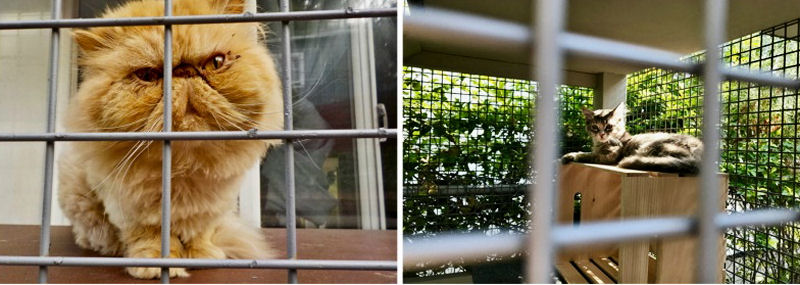

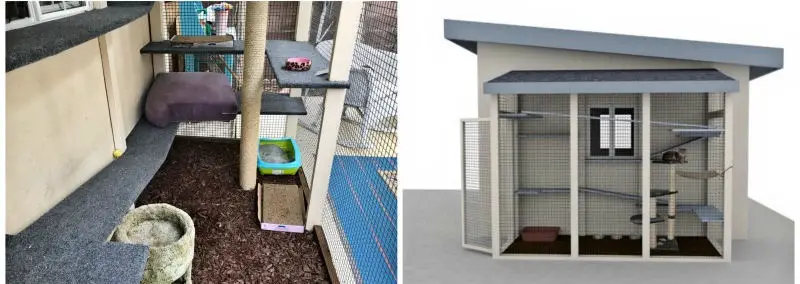
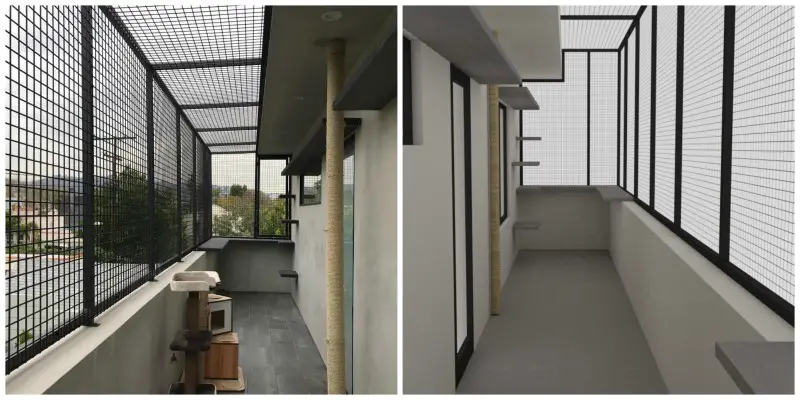
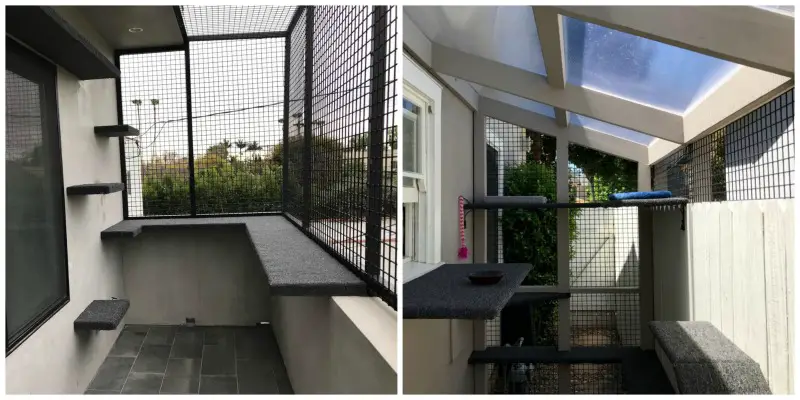

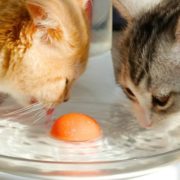
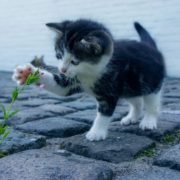
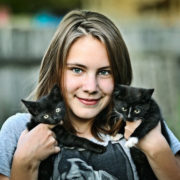
It also leaves them open to fleas. But, I guess it’s a happy medium.
Indoor cats are not free from fleas. In bad flea seasons you can walk through an area where fleas are and bring a flea or three home on your shoe or pant leg. My cats have been 9ndoors 9nly for 20 years. I’ve had 3 flea outbreaks on my cats and they never went outside. Put Bravecto on your cats its good for 3 months, things should be fine.
I agree 100% that cats should not be allowed outside unsupervised, for their wellbeing and our peace of mind. However, on the bird-killing issue, I disagree 100%. The Smithsonian have a long record of bird fanatacism and cat hating which is based upon totally erroneous writings of historical cat haters. One of their number was caught trying to poison cats, which is a felony in all 50 US states. For the facts on cats and birds: alleycat.org/TruthAboutCats. Cats are ADAPTIVE, never “invasive” and the cause of the vast majority of bird deaths domestically and globally is rooted in human behavior. Maybe humans are the “worst invasive species”?
People should look up the statistics of how many birds die yearly from our giant, glass windowed buildings before blaming cats for diminished bird pops. tbh
ABSOLUTELY, @Mandy. HUMANS and our overdevelopment, overconsumption, and overpopulation are the number one cause of bird deaths worldwide. And what is the big deal about wild birds, anyway? I like birds as much as the next person, but they are hardly the most important issue in my life, and they will never be a cause for the kind of concern the bird fanatics claim to have (while in truth, they are cat haters, plain and simple). I would gladly share and praise this article except for that paragraph, which is, to put it politely, erroneous in the extreme and pandering to the cat haters.
In an ideal world, I suppose all cats would be living indoors with responsible owners and access to Catios, but sometimes it’s a bit more complicated. I have two strictly indoor cats that are safe and well-adjusted. I also have four outdoor cats that have cat-door access to the back room where they sleep and spend time if it’s raining, snowing or too cold. The rest of the time they are outside living as wild cats. Since they started out as a feral cat family, they are still too wild to adapt to indoor living. I’ve done TNR with them so they won’t keep reproducing, and I provide them with food and shelter but that’s about all I can do other than catch and vet them if they run into a problem. I’ve grown very attached to them and worry about the dangers in the outside world; it helps that I’m in the country and they rarely go near the road, but there are other dangers, including coyotes, humans, etc. so I worry nonetheless. I feel like I’m doing the most I can given the situation. I love cats and bond with them quickly – including the feral ones, but sometimes there is a limit to what one can do.
time being wild to ever be happy indoors. As I said, some situations are a little more complicated.
I love the idea of a catio for our indoor cats. The life the homeless cats in Bulgaria is a short one often with harsh conditions. In an ideal world, all cats would live indoors with catios!